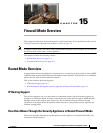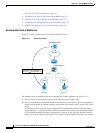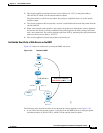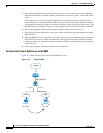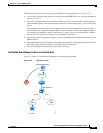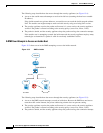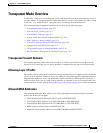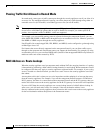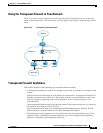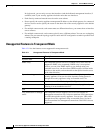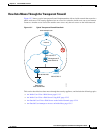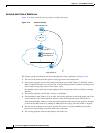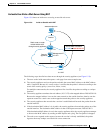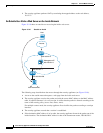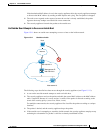
15-10
Cisco Security Appliance Command Line Configuration Guide
OL-12172-01
Chapter 15 Firewall Mode Overview
Transparent Mode Overview
In single mode, you can only use two data interfaces (and the dedicated management interface, if
available) even if your security appliance includes more than two interfaces.
• Each directly connected network must be on the same subnet.
• Do not specify the security appliance management IP address as the default gateway for connected
devices; devices need to specify the router on the other side of the security appliance as the default
gateway.
• For multiple context mode, each context must use different interfaces; you cannot share an interface
across contexts.
• For multiple context mode, each context typically uses a different subnet. You can use overlapping
subnets, but your network topology requires router and NAT configuration to make it possible from
a routing standpoint.
Unsupported Features in Transparent Mode
Table 15-1 lists the features are not supported in transparent mode.
Table 15-1 Unsupported Features in Transparent Mode
Feature Description
Dynamic DNS —
DHCP relay The transparent firewall can act as a DHCP server, but it does not
support the DHCP relay commands. DHCP relay is not required
because you can allow DHCP traffic to pass through using two
extended access lists: one that allows DCHP requests from the inside
interface to the outside, and one that allows the replies from the server
in the other direction.
Dynamic routing protocols You can, however, add static routes for traffic originating on the
security appliance. You can also allow dynamic routing protocols
through the security appliance using an extended access list.
IPv6 You also cannot allow IPv6 using an EtherType access list.
Multicast You can allow multicast traffic through the security appliance by
allowing it in an extended access list.
QoS —
VPN termination for through
traffic
The transparent firewall supports site-to-site VPN tunnels for
management connections only. It does not terminate VPN connections
for traffic through the security appliance. You can pass VPN traffic
through the security appliance using an extended access list, but it
does not terminate non-management connections. WebVPN is also not
supported.



